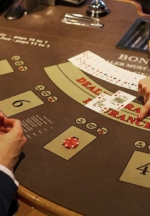
For a lot of people, Nevada is seen as the home of gambling in the US, and the city of Las Vegas is an internationally recognized casino hotspot in its own right.
However, New Jersey is also a state with a history of supporting legal games of chance, and in recent years it has arguably made more headway in pushing this pastime to the next level than its counterpart to the west.
To explore this relationship further, here are a few interesting and little known facts and figures relating to gambling in both NV and NJ.
New Jersey has historically led the way for online gambling
You might have assumed that Nevada would be one of the first places to embrace online casinos as soon as this type of business was made legal on American soil. However, New Jersey was far more willing to support web-based gambling as an early adopter.
The first casino sites were legalized in NJ back in 2013, and today there are lots of high profile places to play online, found on sites like Gambling-NewJersey.com.
In fact, as well as pushing ahead with online casinos, NJ was also a mover and shaker in terms of promoting remote sports betting as well, with more than $1.3 billion wagered in a single month.
In comparison, Nevada’s sports betting revenues are way below that of NJ, and it has yet to fully embrace online casinos.
To understand why this is the case, you need to appreciate the role that land-based casinos play in shaping gambling regulations in NV. There was hesitation around legalizing online gambling because bricks and mortar operators didn’t want to lose out on income, or see visitor numbers tumble.
A lot of this debate has been reframed since the pandemic, as online gambling proved a useful lifeline for land-based casinos in states like NJ where they were legal.
Nevada legalized gambling over 40 years earlier than New Jersey
While NJ is a frontrunner in the online gambling sphere, NV easily outpaced it with its eagerness to give the green light to land-based casinos.
This occurred all the way back in 1931, at a time when the entire country was reeling from the Great Depression, and the authorities in every state were scrabbling for strategies to stimulate local economies and keep the public coffers topped up with tax revenues.
Choosing to legalize gambling in this way led to the gradual yet inevitable rise of Las Vegas as the home of the modern casino scene.
It was not until the 1970s that New Jersey took similar action, with Atlantic City being chosen as a location in which legal gambling could take place in order to regenerate this ailing seaside settlement in the aftermath of an industrial collapse.
As you can see, in both instances the decisions to legalize gambling were inspired by economic hardships; it’s just that it took NJ almost four decades to come to the same conclusion as lawmakers in NV.
Las Vegas edges out Atlantic City in terms of annual visitors
There’s no question that both Las Vegas and Atlantic City are attractive to tourists, with people coming from across the US and even flying from distant lands to visit.
What might surprise you is that although Nevada’s gambling Mecca is more popular as a destination than New Jersey’s, the gap between them is not as big as you’d expect.
In 2019, the total number of visitors who ended up in Las Vegas was just under 43 million. Meanwhile, Atlantic City welcomed 27 million people to its casinos and other tourist-focused attractions.
There’s a dramatic difference in the number of casinos
Finally, if you want to visit the place with the most variety in terms of casinos, Las Vegas takes the cake, with more than 140 different venues hosting games of chance within its borders.
In comparison, the nine casinos of Atlantic City sound a little lacking. But quality is of course more important than quantity, and you can definitely enjoy some world class experiences in New Jersey, as well as in Nevada. And if you don’t fancy visiting a casino in person, you can always use online services instead.



















